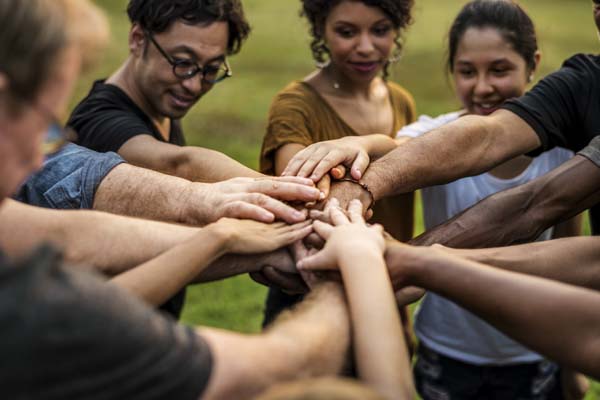Use 'Print preview' to check the number of pages and printer settings.
Print functionality varies between browsers.
Printable page generated Monday, 23 February 2026, 6:36 PM
Unit 8: Growing skills and understanding for a sustainable world
Introduction

Welcome to Unit 8, the final unit of Sustainable pedagogies.
Education can be seen in many ways; as a process that helps people gain qualifications that enable them to get a good job or as a process that helps people discover themselves and realise a complete sense of being human. In this latter sense, it is a process that helps a person find meaning and purpose in being useful to society, and which can equip them with an acute sense of justice, order and equity.
Such learning and transformation are at the heart of the sustainable pedagogies you have studied in this course. You will have seen that across the world there is a growing movement seeking to redefine and redesign education so learners are allowed to grow the skills and understanding they need to live sustainably in the world.
Sustainable pedagogies allow learners to:
grow empathy with others and use compassion
work and learn in partnerships that require full participation
explore the power of transdisciplinarity
know that there is much to learn from ecological wisdom in traditional knowledge.
Connecting all these ideas can lead to a transformation of the way that learners approach the world and see their place within it.
This unit will start with exploring ideas of ecologies and networks of resilience and then will look back on the learning from the other units to look forward to how you will embed the principles of sustainable pedagogies in your practice. You will be asked to focus on your learners – are they equipped to work and think sustainably using current pedagogical practices?
Next go to Unit 8 learning outcomes.
Unit 8 learning outcomes
By the end of this unit you will have:
- Understood more about ecologies and networks of resilience.
- Considered how your learning throughout this course can be used in your practice in your context.
- Questioned how you can share your learning with others in your environment.
Activity planner
| Activity | Task | Timing (minutes) |
|---|---|---|
| 8.1 | Look back at Units 1–4. Reflect on learning and how it has changed throughout the course. Post on forum discussion. | 45 |
| 8.2 | Look back at Units 5–7. Make commitments to changes in practice:
Post on forum discussion. | 45 |
| 8.3 | How can you use the cards that you have collected and developed throughout the course with others? Make a teaching session plan and use and evaluate the plan. Post on forum discussion. | 45 |
1 Ecologies and networks of resilience

Ideas about resilient ecological networks were highlighted by the Making Space for Nature report (Lawton et al., 2010) which demonstrated the widely accepted mantra that wildlife sites had to be ‘better, bigger, more and joined’ if ecological networks were to be resilient in the face of continuing environmental change and human pressures. ‘Resilience ecology’ was defined in this report as not being at risk of extinction and being capable of sustaining wildlife populations into the future. In 2010, it is possible that the full nature of the risk of extinction to non-humans had not been made clear along with the urgent nature of establishing ‘better, bigger, more and joined’ networks to provide habitats capable of sustaining life in an ever-heating world. The 2023 wildfires across North America, Europe and Hawaii along with flooding in parts of Asia have shown that humans are now at severe risk from failing ecological systems.
Building the needful resilient ecological networks to make a difference requires the skills developed by people who have understood the sustainability principles of compassion, partnership, participation, transdisciplinarity and the contribution of traditional ways of thinking. Only then will networks be built and the individualistic thinking that has put the world at risk become outmoded.
 Explore
Explore
Watch the video on defining and delivering resilient ecological networks in England.
UK Centre for Ecology and Hydrology (2018) Defining and delivery resilient ecological networks.

To secure the kinds of resilient ecological networks that can sustain our world, we can be inspired by the work of Fred Windsor (2020) on resilient agroecosystems in South America and the USA National Ecological Observatory Network (Robinson et al., 2022). Researchers Fougeres and Ruiz Reyes (2018) are leading a group looking at Social-Ecological Resilience and Transformation, identifying the necessary conditions for resilient networks. They identified that resilient systems need:
- Resilience: to be able to absorb disturbance and shocks and still retain essentially the same structure, function and identity.
- Adaptability: the capacity of actors in a system to learn and adjust their responses to changing external drivers and internal processes.
- Transformability: the capacity to alter trajectory and cross into a new course when ecological, economic, or social structures make the existing direction unsustainable.
Re-imagining networks and organisations as non-hierarchical, inter-relational, and evolving, can enable such networks to chart a course towards a more adaptable, transformable, resilient, and just future. Such networks can be imagined by learners who have themselves learned through being part of partnerships, know the strength that comes through participation, and have learned through compassionate pedagogies.
 Reflection
Reflection
Reflect on what you think about when you think about networks of resilience.
Why do you think such networks are useful in working towards sustainability? What drawbacks do you see in using the term?
![]() Make a note of your thoughts. This could be a list of words and phrases, or pictures and drawings.
Make a note of your thoughts. This could be a list of words and phrases, or pictures and drawings.
 Explore
Explore
If you want to read more about contemporary conceptualisations of network learning thinking, scan through Hybrid Ecological Networks: A Speculative Exploration of Network Design by Pavel Cenkl (2023) and read sections:
- ‘Material Ecology: Reimagining Nodes’
- ‘Movement Ecology: (Re)envisioning Network Flows’
- ‘Corridor Ecology: Pathways in Networks’
- ‘Emergence of Hybrid Ecological Networks’
Look out for some of these ideas covered in this course.
2 Looking back to look forward
In this section there will be two activities that invite you to look back at the principles, concepts and ideas that you have been asked to think about and apply to your context as you have worked through this course.
The aim of these activities is partially to remind you of the sustainable pedagogies you have been asked to interact with, but perhaps most importantly, to remind you of your reactions to those pedagogies and how you consider they would fit into your practice in your context.
2.1 Sustainable pedagogies in your context
In the next activity you are asked to look back at your learning on the course from Units 1–4. The first of these units offers reasons why sustainability is considered an important aspect of education in the twenty-first century.
Units 5–7 offered ideas about what can be considered a sustainable pedagogy and why. Activities in these units also asked you to think about how you could use those pedagogies in your context and professional practice and what you could achieve by doing so.
Activity 8.1 What do sustainable pedagogies mean to you?
![]() Post your ideas on the Activity 8.1 forum discussion, read what others have posted and comment on the good ideas you read there.
Post your ideas on the Activity 8.1 forum discussion, read what others have posted and comment on the good ideas you read there.
This post is important for assessing your eligibility for a badge.
Remember that, to obtain your digital badge, you must have posted a contribution to at least one forum in Units 1–7 and one of the forums in Unit 8. You must have also completed the quiz at the end of Unit 5 and scored at least 80%.
2.2 Sustainable pedagogies, locally and globally
In the next three units, Unit 5 asked you to look at wider issues and how transdisciplinarity can offer more to your learners in a sustainability context. Unit 6 looked at what it means to transform the way that individuals see their role in sustainability, and how that might in turn work to the benefit of the human and non-human world. Unit 7 asked you to think about how traditional wisdom can allow us to see how to act in the world, in concert with natural environments, rather than working against the forces of nature.
Activity 8.2 How did you extend your understanding?
![]() Post your ideas on the Activity 8.2 forum discussion and read what others have posted.
Post your ideas on the Activity 8.2 forum discussion and read what others have posted.
This post is important for assessing your eligibility for a badge. Comment on the good ideas you read there.
Remember that, to obtain your digital badge, you must have posted a contribution to at least one forum in Units 1–7 and one of the forums in Unit 8. You must have also completed the quiz at the end of Unit 5 and scored at least 80%.
3 Working with others to introduce sustainable pedagogies

Sustainable pedagogy is about working in the world, not as an individual but as part of society in your immediate community, your wider local community, and global society. Creating partnerships, participating in the change you want to see and working across disciplines and normalised barriers are all part of working for a sustainable future that works for the benefit of your current learners, and for the future world.
Throughout the course at the end of each unit you have encountered memo cards – onscreen and PDF versions – that reflect each unit’s main learning objectives. The PDF files are for you to keep digitally but they are also designed to print out if you wish. If you print the memo cards, you could:
Leave them in a stack by your workstation and choose one at random to spark a memory of the concepts that you need to be able to offer for sustainable learning, and the actions you need to take.
Display them where they will catch your eye when you are thinking about how to facilitate a learning session.
Use them for some other ideas that have not been covered yet!
The next activity asks you to plan a session with your colleagues that uses the cards to introduce them to the ideas of sustainable pedagogies. In this session it will be beneficial to ask your colleagues to work collaboratively and to use dialogue to enter a brave space where everyone is treated with respect and can express their ideas and concerns freely. The cards can help provide the vocabulary needed for such a discussion.
Activity 8.3 This is the time to act
Throughout the course you have been offered memo cards that encapsulate key learning points offered in each unit.
Here you are asked to use those memo cards to plan and conduct a session to enable your co-educators to understand and use some of the sustainable pedagogies concepts that you have been studying, in their teaching practice.
![]() Task 1 Plan your session
Task 1 Plan your session
1. In order to plan your session consider how you will:
Use the screen of 21 cards (below) – It is recommended that you pick three cards that cover areas of the course that you found the most interesting, and think would be the most useful to discuss with your colleagues.
Step 1 tab – Select your three favourite cards so the outer edge turns red.
Step 2 tab – Selected cards are displayed full size – click to view text.
Discuss the text on each card, the ideas that are brought to mind and the way that those ideas can help your students develop the knowledge and skills required for more sustainable behaviours.
Make sure everyone feels able to contribute to the discussion. Will you set out rules of engagement? Will you explain that the meeting is intended to be a brave space and explain that this means all voices and opinions are to be respected and above all, heard?
Ask your co-educators questions that will help them think about how they can add the pedagogies from the three selected cards to their teaching context, and have some clear ideas to help them with this too.
Show your co-educators part(s) of the unit in the course that explain the ideas on the cards and the difference they might make to the way that they ask their students to engage with difficult ideas about sustainability.
Ask your co-educators if there is more they would like to learn after reading through the cards. Here you could re-select three cards that the group want to talk about.
To do this click on a selected card again in the ‘Step 1’ tab to deselect it, before choosing another.
If some at the meeting are showing a particular interest, arrange to send the course link and PDFs of the course cards to motivate them to learn more about sustainable pedagogies.
Make a plan with your co-educators to help them include some sustainable pedagogies ideas in their teaching. Think about how you may want to set it up other follow-up sessions.
Make a plan for how you want to conduct the session by detailing this in your learning journal, using this planning template or otherwise.
![]() Task 2 Conduct your session
Task 2 Conduct your session
1. Set a date and ensure all participants know whether it is:
A face-to-face meeting – in this case the print friendly PDFs of the cards will be useful as they have been designed to be printed and cut out.
An online meeting – in this case the onscreen version above will be the most useful and will work well using a ‘share screen’ function.
2. Conduct the session, taking into account the considerations from Task 1 and the notes you recorded on the template file provided to assist you.
2. ![]() Post a 100-word summary on the Activity 8.3 forum discussion.
Post a 100-word summary on the Activity 8.3 forum discussion.
Remember that, to obtain your digital badge, you must have posted a contribution to at least one forum discussion in Units 1–7 and one of the forum discussions in Unit 8. You must have also completed the quiz at the end of Unit 5 and scored at least 80%.
4 Summary of Unit 8

This unit has asked you to look back at your learning from the whole course and make commitments for how you want to move forward using sustainable pedagogies.
In Activity 8.1 you questioned what you thought about the ideas and principles of sustainable pedagogies. You then questioned whether the connections you made between those ideas as you progressed through the course, changed the way you saw the sustainable pedagogies you learned about.
In Activity 8.2 you consolidated your learning and established how you will use sustainable pedagogies to enable your learners to think and act sustainably with the world around them.
The course ended by asking you to explore how you could use the Sustainable pedagogies cards you encountered at the end of each unit to encourage your colleagues to join you in using sustainable pedagogies for the benefit of your learners and the natural environment.
Further reading
UK Centre for Ecology & Hydrology (2018) Defining and delivering resilient ecological networks, 27 June, [YouTube]. Available at: https://www.youtube.com/ watch?v=YguwKh4fh5g (Accessed: 6 March 2024).
Cenkl, P. (2023) ‘Hybrid Ecological Networks: A Speculative Exploration of Network Design’, 17 July Ecologies of knowing. Available at: https://ecologiesofknowing.com/ 2023/ 07/ 17/ hybrid-ecological-networks-a-speculative-exploration-of-network-design/ #:~:text=In%20a%20speculative%20hybrid%20ecological,the%20face%20of%20network%20disruption (Accessed: 14 February 2024).
References
Lawton, J. H., Brotherton, P. N. M., Brown, V. K., Elphick, C., Fitter, A. H., Forshaw, J., Haddow, R. W., Hilborne, S., Leafe, R. N., Mace, G. M., Southgate, M. P., Sutherland, W. J., Tew, T. E., Varley, J., and Wynne, G. R. (2010) Making Space for Nature: a review of England’s wildlife sites and ecological network. Report to Defra. Available at: https://www.researchgate.net/ publication/ 268279426_Making_Space_for_Nature_A_Review_of_England%27s_Wildlife_Sites_and_Ecological_Network (Accessed: 5 March 2024).
Fougeres, D. and Ruiz Reyes, M. (2018) IUCN CEM Social-Ecological Resilience and Transformation Thematic Group. Available at: https://www.iucn.org/ our-union/ commissions/ group/ iucn-cem-social-ecological-resilience-and-transformation-thematic-group (Accessed: 18 October 2023).
Cenkl, P. (2023) ‘Hybrid Ecological Networks: A Speculative Exploration of Network Design’, 17 July Ecologies of knowing. Available at: https://ecologiesofknowing.com/ 2023/ 07/ 17/ hybrid-ecological-networks-a-speculative-exploration-of-network-design/ #:~:text=In%20a%20speculative%20hybrid%20ecological,the%20face%20of%20network%20disruption (Accessed: 14 February 2024).
Robinson, N., Barnett, D., Jones, K., Stanish, L. and Parker, S. (2022) ‘Multiple Dimensions of Resilience: How NEON Supports Ecology and the Research Community in the Face of Compounding Disasters’, Front. Environ. Sci, 10(653666). Available at: https://doi.org/ 10.3389/ fenvs.2022.653666 (Accessed: 18 October 2023).
Windsor, F. (2020) Using network ecology to understand and secure resilient agroecosystems. Available at: https://www.coventry.ac.uk/ research/ about-us/ research-events/ 2020/ network-ecology/ (Accessed: 5 March 2024).